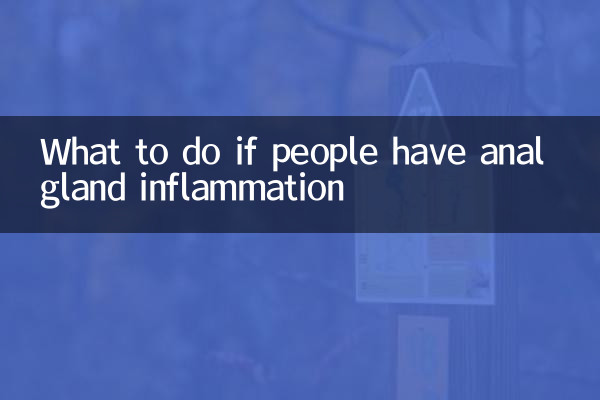What to do if people have anal gland inflammation
Recently, anal gland inflammation has become one of the hot topics in the health field. Many netizens asked relevant questions on social platforms and medical forums, reflecting public concern about the disease. This article will combine popular discussions and medical advice in the past 10 days to provide you with detailed answers to the treatment of anal gland inflammation.
1. What is anal gland inflammation?

Anal gland inflammation refers to infection or inflammation of the glands around the anus. Common symptoms include anal pain, swelling, increased secretions, etc. If not treated promptly, perianal abscess or anal fistula may develop.
2. Common symptoms of anal gland inflammation
| Symptoms | Description |
|---|---|
| anal pain | Persistent or intermittent pain, especially when having a bowel movement |
| swelling | Redness, swelling or hard lumps around the anus |
| secretions | Purulent or bloody discharge from the anus |
| Fever | In severe cases, it may be accompanied by systemic symptoms such as fever |
3. Causes of anal gland inflammation
Anal gland inflammation is mostly caused by bacterial infection. Common causes include:
| Reason | Description |
|---|---|
| bad hygiene habits | Incomplete anal cleaning leads to bacterial growth |
| Chronic constipation or diarrhea | Stimulate the tissues around the anus |
| low immunity | People with diabetes and HIV infection are more likely to develop the disease |
| anal injury | Such as anal sex, foreign body stimulation, etc. |
4. Treatment of anal gland inflammation
Based on recent medical discussions, treatments can be divided into the following categories:
| Treatment | Applicable situations |
|---|---|
| Conservative treatment | Suitable for early stage patients with mild symptoms |
| drug treatment | Including antibiotics, painkillers, etc. |
| surgical treatment | Suitable for those with abscess formation or recurring abscesses |
| Traditional Chinese Medicine Treatment | Such as traditional Chinese medicine sitz bath, acupuncture and other auxiliary therapies |
5. Specific treatment plan
1.Conservative treatment: Keep the anus clean, take sitz bath with warm water 2-3 times a day, 15-20 minutes each time; avoid spicy and irritating food; keep defecation smooth.
2.drug treatment: Use antibiotics (such as cephalosporins, metronidazole, etc.) under the guidance of a doctor; if the pain is severe, analgesics can be used appropriately.
3.surgical treatment: For those who develop abscesses, abscess incision and drainage are required; those with recurrent abscesses may require anal fistula surgery.
6. Preventive measures
The key to preventing anal gland inflammation is to:
1. Maintain good personal hygiene habits
2. Eat a balanced diet and consume more dietary fiber
3. Avoid sitting for long periods of time and exercise appropriately
4. Treat constipation or diarrhea promptly
7. When Do You Need Medical Treatment?
You should seek medical attention immediately if:
1. Severe pain that affects daily life
2. Fever and other systemic symptoms
3. Obvious lumps or pus appear in the anus
4. Symptoms persist for more than 3 days without relief
8. Recent hot discussion points
1. Some netizens shared their experience of boiling honeysuckle water for a sitz bath, but doctors warned that folk remedies should be used with caution
2. There is a lot of discussion about "minimally invasive surgery" to treat anal adenitis.
3. Anal gland problems among working professionals caused by prolonged sitting have aroused widespread resonance.
Summary:Although anal gland inflammation is common, it cannot be ignored. Timely and correct treatment and preventive measures are key. It is recommended to choose an appropriate treatment plan under the guidance of a doctor to avoid self-medication and delaying the condition.

check the details

check the details